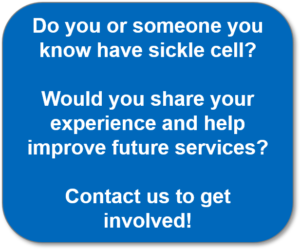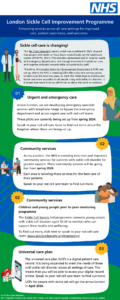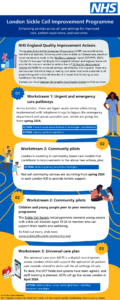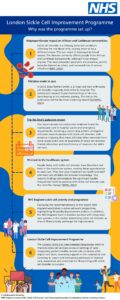What is sickle cell disorder?
To launch sickle cell awareness month, we produced an infographic to improve understanding about what sickle cell is and why it is important to raise awareness. Please take a look at the infographic here.
- Sickle cell disorder (SCD) is the most common genetic condition in England, with 17,000 people living with the condition.
- SCD can affect anyone, but it is most prevalent in people from African and Caribbean backgrounds.
- A simple blood test with your GP will identify whether you are a sickle cell carrier or have the disorder.
- People with SCD have extremely painful episodes called sickle cell crises, which can be very severe and regularly require hospital admissions.
- South London has the highest number of people living with SCD in the UK with more than 3,800 individuals residing or receiving hospital care, according t the National Haemoglobinopathy Registry in 2019/20.
- Each year, nearly 300 babies are born with SCD. Early detection is key for successful and effective sickle cell management.
A very common treatment for sickle cell disorder are blood transfusions, meaning that blood donations, especially from people of black heritage, are important. “Give Blood, Spread Love, England” is a blood donation project, launched by Sickle Cell Society, to raise awareness on the importance of essential blood donations for people living with sickle cell disorder. To learn more about blood donations, follow the link here.
Why was the London Sickle Cell Improvement Programme launched?
The London Sickle Cell Improvement Programme was set up in response to NHS England‘s sickle cell work programme, which highlighted 10 quality improvement actions for sickle cell services nationally. These actions were based upon the recommendations from the No One’s Listening report, published in 2021 by The All-Party Parliamentary Group on Sickle Cell and Thalassaemia (SCTAPPG).
To learn more about the journey of why and how the London Sickle Cell Improvement Programme was set up, please click here.
What will the London Sickle Cell Improvement Programme involve?
The London Sickle Cell Improvement Programme is a two year plan that seeks to improve sickle cell services across all settings of care in London.


This involves three workstreams: the integration of patient health records into a comprehensive digital care plan, increased support within the community, and investments in urgent and emergency care pathways for improved care, patient experience, and outcomes for individuals living with sickle cell disorder in London. This programme will be operated in collaboration with NHS England, London ICBs, Sickle Cell Society, and the Haemoglobinopathy Coordinating Centres covering London.
We have created two infographics to inform primarily patients, and all healthcare professionals of the new services that are coming in 2024 to improve sickle cell care and treatment for all people with sickle cell disorder across London.
See more information in the infographic here, and here.
Children and young people peer-to-peer mentoring programme
As part of the NHS England funding available for the community workstream within the London Sickle Cell Improvement Programme, an innovation peer-to-peer mentoring programme for children and young people will be rolled out across all five London ICBs, in partnership with Sickle Cell Society. The mentoring programme originated in 2017 by City and Hackney Clinical Commissioning Group, in collaboration with Sickle Cell Society, and due to its success, was funded in the North East London footprint, and is now being adopted across all of London.
The mentoring programme aims focuses on self-care, education, emotional support, visits during crisis, and has yielded many benefits, including reduction in A&E visits, inpatient stays, and bed days.
To learn more about the peer-to-peer mentoring programme, please see the infographic here.
Sickle Cell Awareness Month
September is sickle cell awareness month. In September 2023, we worked to:
- Raise awareness about sickle cell disorder, and its impact on individuals and communities
- Promote the work that is currently happening in London focussed on improving services and outcomes for people with sickle cell
- Engage with individuals living with sickle cell, healthcare professionals, commissioners, and communities to further develop and improve the way the NHS delivers care for people and communities with sickle cell
Community services
On 9 January 2025, ITV highlighted the enhanced community services within South East London. Learn more about how these extended services are benefiting people living with sickle cell.
Video courtesy of ITV News


